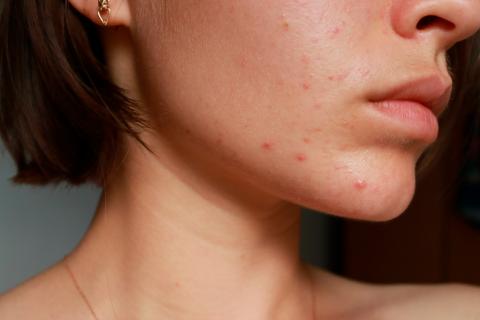
Acne is a very common skin problem, since it is estimated that it affects 80% of adolescents, although it can also be suffered in adulthood. It is characterized by the appearance of spots, cysts, scars or pigment alterations, especially on the face, but also on the neck, chest or back. The unsightly appearance of the affected areas is a cause for concern, which can cause psychological disorders, especially in the youngest.
There are various treatments for acne, but they are not always effective, so scientists continue to search for solutions. Now a study of the genetics of acne has made it possible to identify 29 regions of the genome that influence this condition and that provide new potential targets for treating it. In addition, these findings may also help doctors identify individuals who are most at risk of developing severe acne.
To carry out this research – the largest of its kind – which has been led by scientists from St John’s Institute of Dermatology at Guy’s and St Thomas’ NHS Foundation Trust and King’s College London and the QIMR Berghofer Institute of Medical Research in Brisbane, Nine data sets from worldwide patient genome-wide association studies were analyzed in which the entire genomes of 20,165 people with acne and 595,231 without the condition had been scanned.
“The causes of acne are complicated, with a combination of biological factors such as genetics and hormones, and environmental factors. Understanding his genetics will help us find the best way to treat him.”
In this way they were able to identify 29 new genetic variants that are more common in those with acne, and also confirmed 14 of the 17 variants that had previously been associated with this condition, making a total of 46 known variants. Among the genes identified are several that are common in individuals with acne and are also related to other skin and hair problems.
Link between genetic risk of acne and severity of condition
The authors of the work, which has been published in Nature Communications, think that their results will help to understand the causes of acne, whose origin could be a combination of different factors. These scientists have also found a link between the genetic risk of acne and the severity of the disease, since they found that people with a higher genetic risk are more likely to have a serious disease, so the discovery increases the chances of identifying them for be able to carry out an early intervention.
Professor Catherine Smith, Professor of Dermatology and Therapeutics at St John’s Institute of Dermatology at Guy’s and St Thomas’, said: “Despite significant advances in the treatment of other skin conditions, progress in acne has been limited. In addition to suffering from acne symptoms, people describe profound and consequential negative impacts on their psychological and social well-being. It is exciting that this work opens up the possibility of finding potential avenues to find treatments for them.”
For his part, Professor Michael Simpson, director of the genomic medicine group at King’s College London, has concluded: “We know that the causes of acne are complicated, with a combination of biological factors such as genetics and hormones, and environmental factors. . Understanding the genetics of the condition will help us unravel some of these causes and find the best way to treat the condition. This is a really promising area for further study and opens up a lot of avenues for research.”
.















